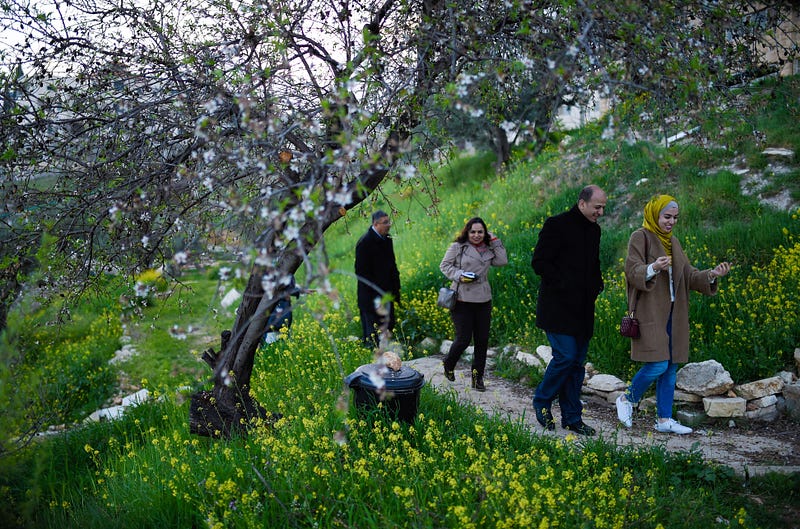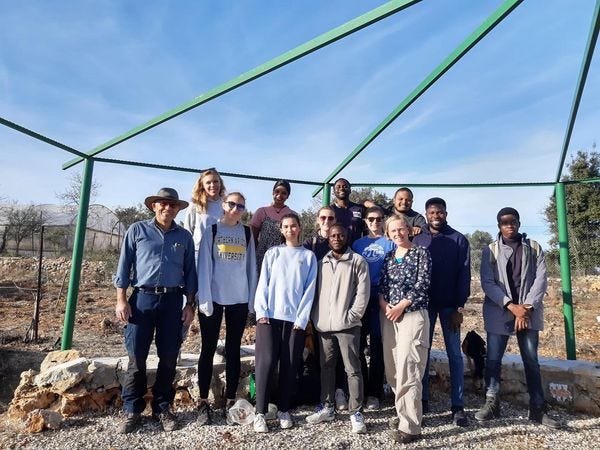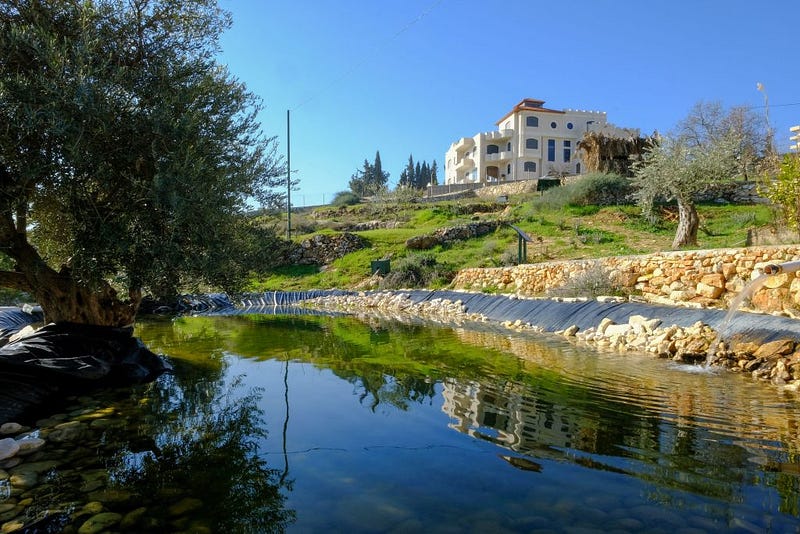Capital has conquered the land – Return it to its rightful owners.

Last week I got to hear Dr. Mazin Qumsiyeh, director of the Palestine Institute for Biodiversity and Sustainability (PIBS). He described the effects of Israeli colonialism on Palestinian people, animals, plants, water and land. I came away with the understanding that if life on Earth is to survive, colonialism has to go.
PIBS tries hard to protect the land, but they face great obstacles. Imagine trying to preserve your natural heritage when you don’t control any of it. When someone far away decides what happens to your water and where you can live, or cuts down your trees and builds roads on which only they can drive?
Palestine has strict laws against pollution and deforestation, but they are not enforced, especially against Israelis. The Palestinian government has appointed people to oversee and conserve certain protected areas, but they are often not even allowed to visit them, much less start actual projects.
Journalist Zubayr Alikhan wrote on Mondoweiss, “Israel’s construction of roads, the methods used to do so, and a sheer disregard for their ecological ramifications all threaten and harm Palestinian wildlife. The destruction of animals’ natural habitat — particularly their breeding and nesting sites — through extensive land leveling and the fencing-off of settlement perimeters has disrupted natural passageways and endangered many species, affecting the food chain and local ecosystem as a whole.”
Does all that leveling and fencing remind you of something? Like what has happened to the whole United States of America in suburban sprawl since World War 2?
The colonial relationship to land is killing much of Earth. What’s happening in Palestine has happened all over the global South and in North America for centuries. It’s only because Palestine is being destroyed in current time, and because their scientists and journalists tell the world what’s happening, that we can see the destruction and try to stop it.
What is colonialism?
Colonialism means the domination of weaker countries, usually in the global South by richer, more powerful countries in the North. Most colonialism resembles what the British did in India and the Spanish in Mexico: the sustained looting of a colony’s minerals and other natural resources. But sometimes, like in America and Palestine, colonizers don’t just grab and run; they stay. This is called settler colonialism and usually involves the mass displacement or killing of the indigenous people and other life.
Colonizers see conquered land as a profit center. The land is a storehouse of treasures they can haul away, leaving a wasteland behind if it profits them. To the colonized, their land is home, and its long-term health is a top priority. Unfortunately, the colonial attitude toward land often spreads and distorts people’s attitude to nature in general.
In modern capitalism, the colonizers often can do without military control of the land (though that still happens, like the US military in Syrian oil fields.) Instead, multinational corporations can corrupt indigenous governments or install new ones willing to sell their resources to colonizers. If necessary, the rich countries’ military or their local proxies can push the native people out of the way.
This is how Japanese and Korean companies take the trees of Indonesia and Southeast Asia for sale in Japan, or multinationals turn them into pulp to make toilet paper for imperial bathrooms. It’s how oil companies spill lakes of oil into jungles in places like Ecuador and Nigeria, poisoning all who live there, far from company HQ. Colonized people may not be literally enslaved as the Americans were by Spanish conquistadors, but they lose their livelihood when they lose their land and wind up serving their colonizers for pennies to stay alive.
Strangers in a strange (to them) land
Even when they aren’t taking all a colony’s wealth, colonizers can make a mess out of conquered land by thinking they know more than the people who live there. When the French ran the West African colony of Niger, they encouraged farmers to remove trees from their fields so they could grow more food. But according to Smithsonian Magazine, in the climate of Niger, the absence of trees caused the land to dry out and grow less foods, while the people lost access to firewood, a main fuel source. The Sahara desert moved in. What worked in France didn’t work in Niger.
The colonial policy of trying to export European ways to the global South wreaks havoc in Palestine, too. According to Dr. Qumsiyeh, “Once Israel was declared a Jewish state in May 1948, native trees (such as oaks, carobs, and hawthorns) and agricultural crops (olives, figs, and almonds) were systematically uprooted and replaced by European pine trees. Pines shed leaves that are acidic and prevent the growth of understory plants, reducing biodiversity. These trees are also very susceptible to fire because of their resins.” Palestine had rarely if ever known forest fires before colonization; now they are a regular occurrence.
It’s not that indigenous people can always prevent land from degrading. Pressure of growing populations and climate change can wear land out. But the pressure from colonialism is far greater, because the people in charge don’t feel they are part of the land. They want to take all they can as fast as they can. This disconnect remains true when colonialism morphs into global capitalism, which gives control of land to investors who do not live there and who seek profit above all.
The two isms have the same core value, that land and living things are sources of profit, not valuable for themselves. And since humans also fall into the category of “land and living things,” it’s not hard to see where colonial capitalism leads. It leads to misery and death, as indigenous people have long known and is now becoming obvious to all of us with climate change and the mass extinction of species.
Decolonizing the land
If colonialism can be pushed back, people can rehabilitate land. In the 1980s, according to the Smithsonian article, farmers in Niger and neighboring Burkina Faso abandoned the colonizers’ advice to clear trees and started going back to traditional methods which grew trees and crops together. They supplemented their plan with other water harvesting techniques and learned how to re-grow trees from the stumps that remained on their land.
They did this without help from their government, the French, or the World Bank. Now large parts of Burkina Faso and southern Niger are turning green, growing more food and firewood for the people. US Embassy staff watching a slide show of regenerated farms commented, “This can’t be Niger. It looks like Ireland.”
In settler colonies, it’s harder to decolonize. Since Native people won’t abandon the land where they grew up,colonizers seek to remove them, as in Palestine. A farm called the Tent of Nations near Bethlehem, has a stated mission of bringing peace to Israel/Palestine, including to the land. They are under constant attack from the Israeli government and settlers who want to take their farm.
According to their Facebook page and the Friends of Sabeel website, their trees are burned and uprooted, crops are bulldozed, permits to build or repair are denied, roads to the farm blocked with concrete, electricity cut off. In response, they fight in court, block armed settlers from their land, and bring groups of volunteers from around the world to help them work the land.

In Bethlehem, Dr. Qumsiyeh and PIBS are trying to restore land and protect threatened species of wildlife. They research and educate about Palestine’s unique flora, fauna, and human ethnography. They create videos on subject such as water and desertification and show them to whoever wants to see them or finds them.
PIBS welcomes visitors and donations. According to their beautiful web site, they teach about biodiversity, history, and permaculture to “promote sustainable communities.” Based at the University of Bethlehem, they have created a natural history museum, large demonstration gardens and water reclamation projects. They teach traditional farming techniques online, on campus, and wherever they’re allowed to teach.

In Palestine and elsewhere in the South, it’s easy to see how colonialism damages Nature. But colonial mindsets, seeing Earth and living things as profit centers and not as home, will always kill. They kill from Louisiana’s Cancer Alley to the burning rainforests of Asia, Africa, and Amazonia. Would capitalists destroy those places if they lived there?
People who live on the land, work it, or love it should be in control of it, indigenous people and family farmers first of all. We can’t save Earth until we take it back from colonizers. I can’t imagine how this process could happen, but can imagine it will at times be bloody and ugly. I doubt strict nonviolence will get it done, and it’s obvious who would have the advantage if things turn violent.
But where we are now, colonizing the world, is already bloody and ugly. It’s unlivable for our living cousins and ultimately for us. We have to act.
Dr. Qumsiyeh’s webinar is here.
— — — — — —
Thanks for reading! Please comment, share, or steal. Follow me on Twitter, on Facebook or on Medium. Hire me for freelancing, editing, or tutoring on Linked In

Thank you for this article dealing with so many important issue and asking urgent questions. I am a long term, full time volunteer at PMNH/PIBS and as an Israeli of Jewish origin recognize the truth of the settler colonialism diagnosis of the situation in Palestine. However, I know for a fact that some Israeli Jewish settlers do care for the land, don’t just exploit it, and have good intentions environmentally. The trouble as I see it, is that even those fail to see the damage they cause by living on the land under military protection, by force.
Thanks Zohar for raising this important truth. I think that while some settlers may appreciate the land, especially those who become farmers, the Israeli government and rulers do not. I’m also afraid that a lot of the settlers, especially those who come from the USA and treat the West Bank like a suburb, probably do not appreciate it.